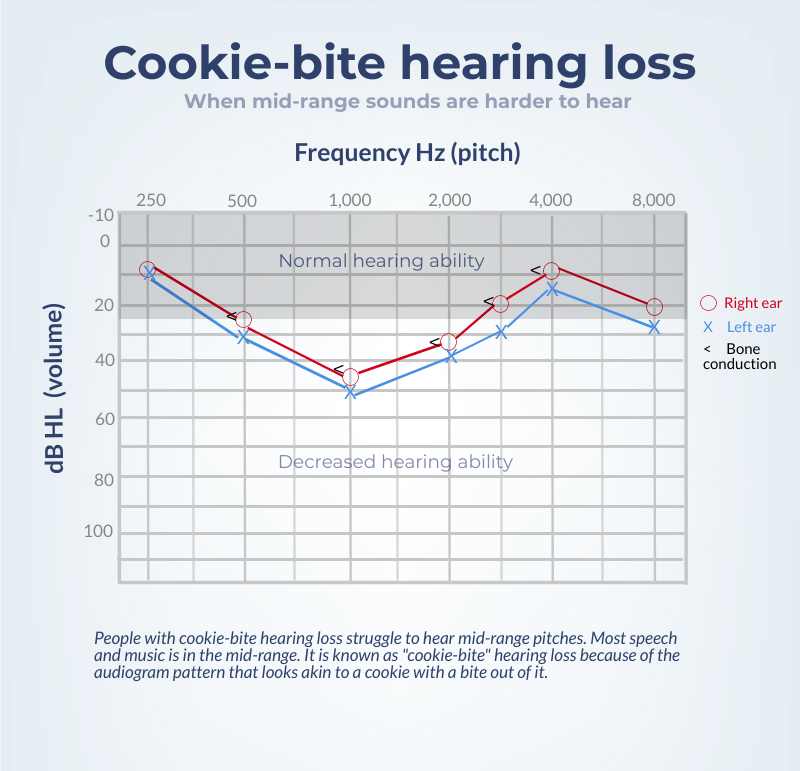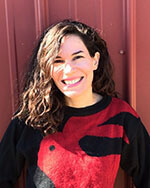|
www.HealthyHearing.com |
Cookie-bite hearing lossThis rare condition makes it harder to hear mid-range pitches, including speech.
Contributed by Madeleine Burry Key points:
Humans can normally hear a wide range of pitches, from low to mid to high. But if you have cookie-bite hearing loss, your ability to hear mid-range hearing frequencies will be affected. A lot of human speech and music is in the mid-range, between 500 Hz and 2,000 Hz. This means you may find yourself raising the volume on the TV or radio, experiencing reduced clarity of speech, or having difficulty hearing in a crowd, explains Dr. Jordan Glicksman, an otolaryngologist and surgeon at Harvard Medical School. Mid-range hearing loss on an audiogramIf you have mid-range hearing loss, your audiogram will be shaped like a bell, or the letter U. This is why it's also known as "u-shaped" hearing loss. “It got that name because when a patient with this pattern of hearing loss has an audiogram and the hearing thresholds are graphed, the pattern is a ‘U’ that looks as if someone took a bite out of it,” Glicksman says.
What you can hear clearly: Your high-frequency hearing may be normal or close to normal, so you’ll still be able to hear high-frequencies noises (i.e., higher pitch sounds like women and children’s voices and bird chirping). You’ll also still be able to hear low-frequency sounds (low-pitched sounds such as bass-heavy music or an engine rumbling). Causes of cookie-bite hearing lossThis type of hearing loss is rare, according to experts. This can make it harder to diagnose, even though early detection can help a person maintain their auditory processing ability (the brain's ability to make sense of sound). Cookie-bite hearing loss is a type of sensorineural hearing loss. This means the sensory and nerve cells of the inner ear and auditory nerve are impaired for some reason. This is why it's sometimes referred to by its longer medical name, "mid-frequency sensorineural hearing loss," or MFSNHL. Typically, cookie-bite hearing loss is a genetic condition, Dr. Glicksman says. “A family history is a risk factor,” he says. Cookie-bite hearing loss can be congenital (aka, something you’re born with) or develop over time due to genetics, he says. There are some less common reasons cookie-bite hearing loss is developed beyond genetics. For instance, a rare benign tumor, known as vestibular schwannoma or acoustic neuroma, can lead to this mid-frequency hearing loss, Dr. Glicksman says. In some cases, mid-frequencing hearing loss is due to drug side effects, or certain viral infections. More: I lost my hearing suddenly due to Ramsay Hunt syndrome. Here’s what I learned. How mid-range hearing loss is diagnosedThe diagnosis process for this form of hearing loss is simple: A hearing test. If mid-range hearing loss is present, the audiogram will show the distinctive pattern that points to cookie-bite hearing loss. Some cases are missed because the hearing loss may be mildIn fact, the biggest challenge for diagnosis may be requesting the test. “It’s commonly a mild form of hearing loss,” Dr. Glicksman says. People may be slow to realize that their hearing has worsened. It can also develop slowlyPlus, he notes, this mid-range frequency loss can occur over a long period of time, as opposed to a sudden hearing loss, which might be more noticeable. Treatment optionsNo cure exists for cookie-bite hearing loss. There’s no surgery or medication that will restore a person’s hearing abilities. However, there are treatment options available to help manage the condition. Per Dr. Glicksman, these include:
Treatment options depend on how severe the hearing loss is, and how eager someone is to rehabilitate their hearing, Dr. Glicksman says. If you or a loved one suspect you have cookie-bite hearing loss, don't hesitate to visit a hearing aid center near you. Madeleine Burry
|
Featured clinics near me
Earzlink Hearing Care - Reynoldsburg
7668 Slate Ridge Blvd
Reynoldsburg, OH 43068

Find a clinic
We have more hearing clinic reviews than any other site!



 Madeleine Burry is a Brooklyn-based freelance writer and editor. She's written about health for several online publications, including Women's Health, Prevention, Health, Livestrong and Good Housekeeping. You can follow her on Twitter @lovelanewest.
Madeleine Burry is a Brooklyn-based freelance writer and editor. She's written about health for several online publications, including Women's Health, Prevention, Health, Livestrong and Good Housekeeping. You can follow her on Twitter @lovelanewest.